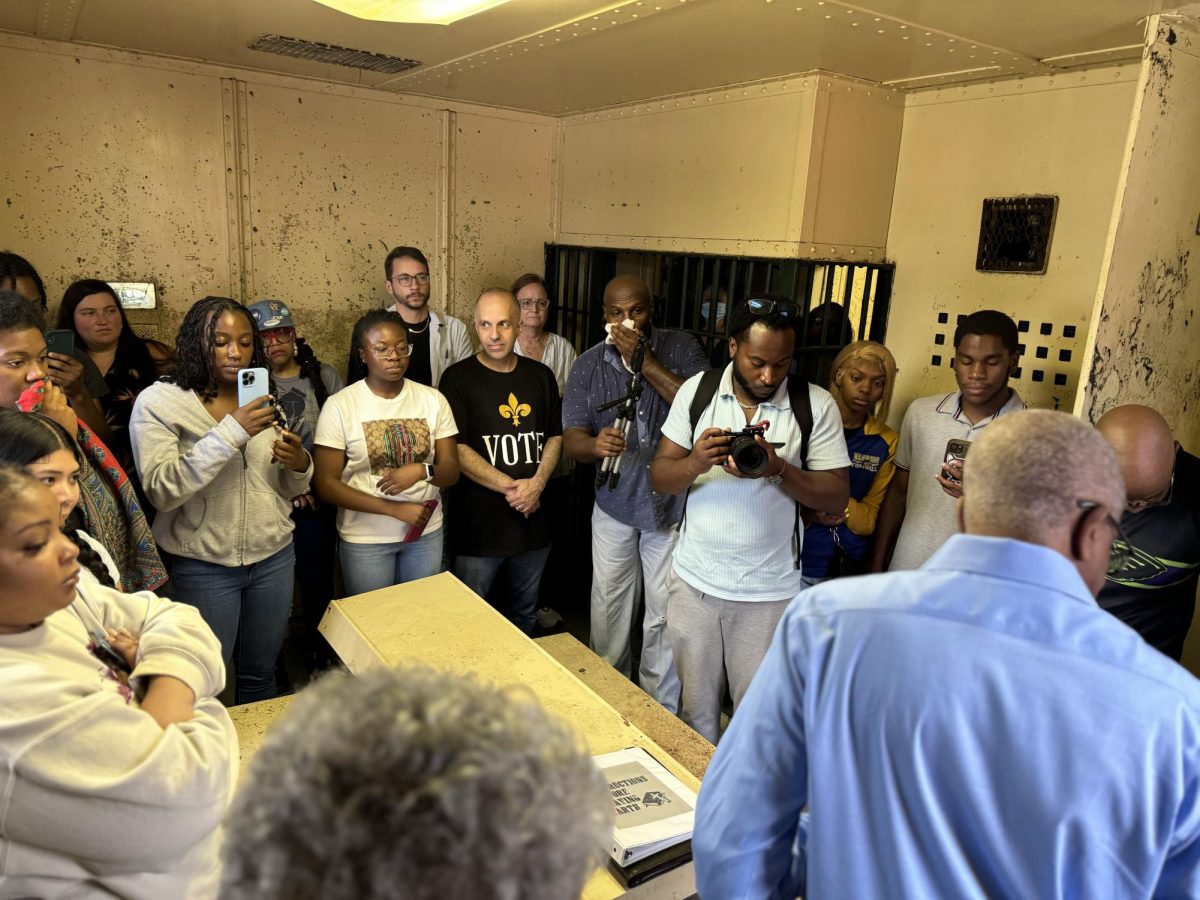On a rainy fall day, several university students like myself, professors and event organizers gathered for an event that sought to bring the lessons of the 1960s Civil Rights Movement into the present day. Sponsored by the Jesuit Social Research Institute at Loyola University New Orleans (JSRI), the Amistad Research Center, the School of Professional Advancement at Tulane University, and the Center for Racial Justice at Dillard University, the event brought together students from each of these institutions to honor the contributions of local civil rights leaders. Among the most notable participants was Civil Rights activist Dr. Ronnie Moore, whose stories from the movement provided vivid insights into the struggles and triumphs of the fight for racial justice in Louisiana. Through a blend of tours, lectures, and discussions, the participants were immersed in the history of the Civil Rights Movement, with particular emphasis on the Baton Rouge Bus Boycott of 1953, the Amistad Slave Ship, and the enduring impact of local activism.
The event was structured as a combination of lectures, tours, and group discussions, all aimed at deepening the participants’ understanding of civil rights history in Louisiana. The day began with a tour of the Amistad Research Center, an institution dedicated to preserving the historical records of African American life and culture. Here, students learned about the Amistad Slave Ship, the famous 19th-century event where African slaves revolted against their captors and ultimately gained their freedom after a lengthy legal battle. This was followed by a tour of the jail where Dr. Ronnie Moore was held, a sobering reminder of the sacrifices made by activists in the struggle for civil rights.
Dr. Moore himself led the group in a discussion about his experiences during the 1960s, particularly his role in organizing protests for African American voting rights. He recounted how he and hundreds of others were arrested for protesting, and shared the extraordinary story of his escape from a church in the back of a funeral hearse, an act that speaks to the ingenuity and determination of the movement. In addition to his personal stories, Dr. Moore provided critical historical context, linking local efforts to national struggles for equality. His stories were supplemented by a tour of the Rosenwald School, a historic institution built to educate African American children in the segregated South, and a visit to the Donaldsonville City Hall, where the group was met by the mayor.
The topics covered during the event spanned the history of civil rights in Louisiana, with a particular focus on the 1953 Baton Rouge Bus Boycott, a seminal event that predated the more famous Montgomery Bus Boycott. Often overlooked in mainstream accounts of civil rights history, the Baton Rouge Bus Boycott served as a blueprint for later actions in the Civil Rights Movement. The boycott, led by Rev. T.J. Jemison was the first large-scale bus boycott in the South, and its success inspired Dr. Martin Luther King Jr. to implement similar strategies in Montgomery. During the event, I learned that Dr. King himself had traveled to Baton Rouge to study the boycott, delivering a sermon at Mount Zion Baptist Church and meeting with local leaders to discuss their strategies. One of the most moving aspects of the event was the opportunity to connect the history of civil rights activism to contemporary issues, particularly mass incarceration. The Civil Rights Movement, while successful in securing many legal rights for African Americans, did not fully dismantle the systems of racial oppression that continue to disproportionately affect Black communities today. Learning about the systematic disenfranchisement of African Americans during the Jim Crow era resonated with the ongoing struggle against mass incarceration. In many ways, the struggle for voting rights and civil rights has evolved into the fight against the prison-industrial complex, which continues to devastate Black communities.
This event strongly connected to our class because it highlighted how the fight for civil rights is far from over. Just as activists like Dr. Ronnie Moore were arrested and jailed for protesting racial inequality, today’s Black communities continue to face disproportionate levels of incarceration. Mass incarceration can be seen as a modern-day extension of the racial oppression that civil rights activists fought against in the 1960s. The prison system, much like segregation laws of the past, disproportionately targets Black and brown communities, contributing to cycles of poverty and disenfranchisement. Understanding the legacy of civil rights activism helps us see how today’s justice system continues to perpetuate racial inequality through policies like mandatory minimum sentences, over-policing, and the school-to-prison pipeline.
Personally, the stories of Dr. Ronnie Moore and the historical events we discussed did not surprise or shock me, though they certainly reinforced a deep sense of frustration. Growing up Black in New Orleans, I have long been aware of the ways in which systemic racism affects every aspect of our lives, from education to housing to criminal justice. Learning about civil rights history often feels like hearing a story that you are already living, and the patterns of oppression repeat in ways that feel all too familiar. While the accomplishments of the Civil Rights Movement are undeniable, the fact that so many of the same issues persist today can be emotionally exhausting. It is difficult to feel surprised or upset by the injustices we learn about when those injustices continue to shape the reality of life in Black communities.
Reflecting on my personal experiences growing up in New Orleans, I cannot help but see the connection between the civil rights struggles of the past and the challenges facing my generation. In middle school, I was part of a large friend group, filled with bright, ambitious young people. But as the years passed, that group dwindled. Some friends dropped out of school, others became entangled in the criminal justice system, and a few tragically lost their lives. Only a handful of us finished high school, and even fewer went on to college. The reality is that the systemic inequalities we face, poverty, underfunded schools, lack of resources create an environment in which many young people never get the chance to fulfill their potential. Like the activists of the 1960s, we too are fighting a system that seems designed to keep us down.
The event was a powerful reminder of the need for continued activism. While the struggles of the past were different in many ways, the fight for justice remains ongoing. As I continue my education and prepare for the future, I am committed to using what I have learned from this experience to advocate for change. The history of civil rights in Louisiana is not just a history of the past; it is a story that continues to unfold, and it is up to my generation to continue the march towards equality. Whether through community organizing, policy advocacy, or education, we must honor the legacy of activists like Dr. Ronnie Moore by continuing to fight for a more just and equitable society.
In conclusion, the event sponsored by the Jesuit Social Research Institute and other academic institutions served not only as a history lesson but as a call to action. By learning about the civil rights struggles of the past, we are better equipped to engage with the challenges of the present. The legacy of the Baton Rouge Bus Boycott, the Amistad Slave Ship, and the activism of individuals like Dr. Ronnie Moore provides a roadmap for how to challenge injustice and build a better future. As we reflect on the hard work and sacrifices of those who came before us, we must also recognize our responsibility to continue the march for civil rights and social justice.








